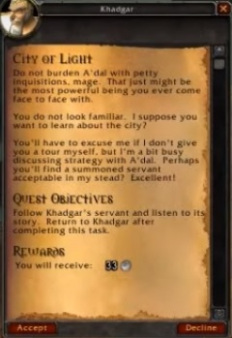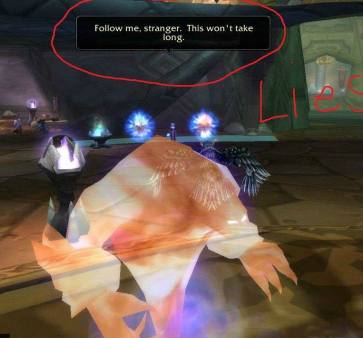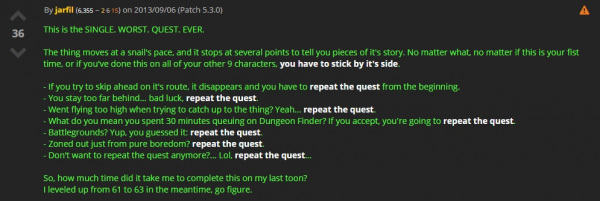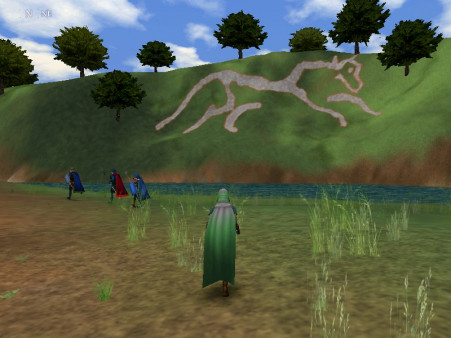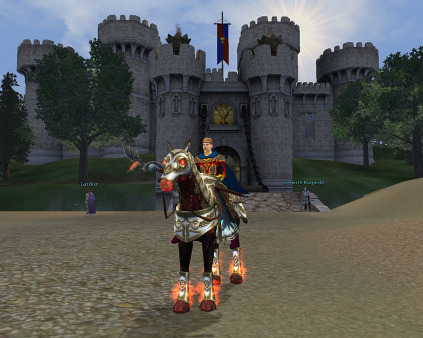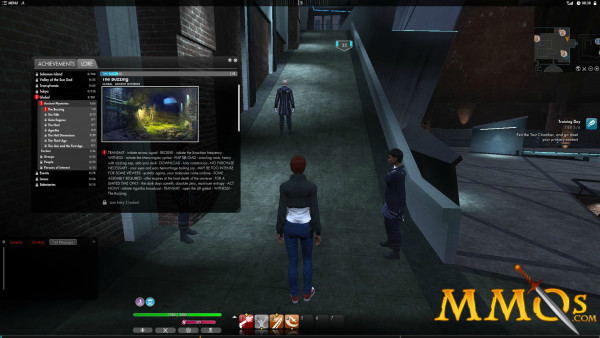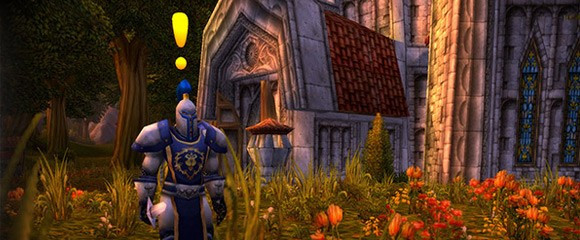Kinder Than Khadgar: How Questing Became the New Grind

You may remember Khadgar from such World of Warcraft quests as Khadgar's Task, The Dark Portal, and Entry Into Karazhan. I remember Khadgar from the words: "Follow me, stranger. This won’t take long."
It was the spring of 2007. A Coke bottle had just spilled onto my mother's carpet, an old flower-patterned creation from the seventies. I was in Shattrath, the central city of the latest WoW expansion. Now and then my gnome shuddered forward, trapped amidst a sea of lag. Finally I got to the quest giver I'd been inching towards, a bearded wizard in a white and blue robe. Khadgar didn't look pleased to see me.
The mage, you see, is quite famous.
Wowpedia calls him "one of the most powerful magi in Azerothian history." Dr_Scaphandre, a user on the charmingly-named HearthPwn.com, declares the Hearthstone Mage version of Khadgar "better then [sic] Medivh, mainly for his emotes." Page 36 of Warcraft: The Last Guardian, a novel featuring the wizard and his former master, explains that "Khadgar" means trust in Dwarven. Even his name is audacious.
A Lesson In Pain
My gnome stared up at the wizard and his quest-signalling exclamation point. A wall of text was incoming. Swallowing hard, I clicked and skimmed.
"You do not look familiar. I suppose you want to learn about the city? You'll have to excuse me if I don't give you a tour myself."
I was being given the old heave ho. Understandably so, Khadgar was pure royalty.
Summoning an elemental, the mage bid me away—except his reskinned Voidwalker tour guide stood rooted to the spot. Around it, player characters ran infinitely: your standard MMO disconnection. I read the elemental's speech bubble before the game threw me to the login screen. "Follow me, stranger," it said. "This won’t take long.
Four attempts later, I wasn't so sure. The elemental servant would spew text about the city, gliding along like an elderly swan. If I made my gnome auto-run, I shot ahead. If I walked, I got left behind. It was impossible to keep pace. More annoyingly, the creature's rambles about Shattrath, my new home, were unfailingly insipid. I would lag and the NPC would get too far away, cancelling the quest and forcing me to start again. A quest that was supposed to take eight minutes ended up taking an hour.
Several expansions later, friends would tell me about bugs plaguing the City of Light quest. My favourite was the one where the NPC stopped talking, rendering the tour—essentially a lore-sharing opportunity—completely pointless. City of Light was cursed. To this day, its Wowhead entry reads like the typed-up notes of a session at Guantanamo.
Quests as awful as City of Light are rare. But in MMORPGs quests that exist solely for taking up time and coughing up XP are frequent enough to be considered the norm. We go from quest hub to quest hub—gathering one, five, ten quests—killing X number of Y creatures, and we accept this is the way we push through our gaming experience rather than quests being an experience all by themselves. Because character level determines our skills, we march dutifully on. Quests may feature people we are supposed to care about, but they regularly reveal nothing new about the story and choose not to test our abilities in a meaningful way. Considering quests are so inescapable, it's unsurprising a fatigue has set in amongst gamers who look to sandbox MMORPGs for something different. But aren’t quests essential to the genre?
Life In The Kill-Based Levelling Era
Pre-WoW, it was more common to "ding" by bashing a million goblins to death. Quests were scarce and scattered about. They featured vague clues about slaughtering a pig under the light of a waning gibbous moon, except when you managed to hunt down a post on a forum that accurately decoded the quest, you realised you'd equipped the wrong knife and your robes were supposed to be dyed mauve. Also you were about five hundred miles to the north of the right location.
The first MMO I loved, Dark Age of Camelot, had a series of epic quests for every class. One of my alts, a Sorcerer, had done four steps of her chain already. I watched as her avatar ran across Salisbury Plains, monsters dotted here and there amongst a wash of green. I was level 28 and understood what it meant to fear death.
Hunting for a guard tower, I got horribly lost. Lowbie mobs came thick and fast. I stunned, turned, and fled. When I found the right tower, it was pitch black on the Plains. By some small miracle— and a lot of squinting—I started clearing out the channelers I was after.
Of course, when they'd all bit the big one, I had completely forgotten what I was doing there. And the quest log wasn't all too helpful in reminding me. It turned out I had to “/use” a staff in my inventory so I could cast a spell that would leapfrog me to the next step. Killing a thousand mobs to reach 29 felt less painful than running about in the dark with little-to-no hand-holding. Because the truth is I did need a bit more help than I was getting, and when WoW came along with its streamlined, intuitive quest system it felt noticeably humane by comparison.
Why is it then that neither old school methods or the novel WoW approach (appropriated by most MMORPGs after it) fulfil our idea of questing in the traditional sense of the word?
As discussed by Ethan Macfie, quests in most MMORPGs are closer to tasks (go here, collect this, kill that). They also flout key questing criteria ingrained in us from literature and mythology. They are easy, repetitive, and quick to conquer. Questing via a conveyor belt from one hub to another, when questing alone is often the only way to reach the level cap, removes the choice and pre-planning found in earlier MMOs.
Thanks to WoW, quests today may be comfortable, but they don’t allow us to stumble into our own stories.
The Secret World And Player Initiative
In 2012, an MMORPG called The Secret World was released to critical praise—at least for its approach to questing.
Why The Secret World works is quite simple:
1) There are no quest hubs.
2) Want quests? Go out and explore.
3) Tiny details in the environment often prove extremely important. Numbers, web addresses, you name it. You have to read documents and learn about the world. The world, in turn, becomes relevant.
4) The number of quests (here missions) you can have at one time is limited. So you’re not bogged down by walls of text and ten objectives to do before dinner.
TSW’s questing gets it right by forcing players to wander about and soak up the atmosphere in the process. An Investigation Mission, for example, may force you to find an obscure item in a church. And real world knowledge can be a big advantage. The developers give you an in-game browser so you don’t tear your hair out while playing, but knowledge of Morse code or the Bible may very well come in handy.
Questing feels personal.
The Secret World rewards curiosity. It also breathes wonder back into questing by lending meaning to objects and textures.
While questing in Dark Age of Camelot felt like trying to solve a Rubik’s cube with my hands tied behind my back, solving puzzles in TSW was difficult without being cruel. That’s not to say I didn’t cheat and look up answers. I just appreciate alternatives to the WoW cakewalk.
The Future Of Quests In MMORPGs
Quests needn’t be essential to the genre. Games should allow us to level up via crafting, exploring, performing music, and interacting socially. When questing can generally be reduced to five different types, it calls for a change.
It’s good to remember, though, that Khadgar and his infamous City of Light stand at the pinnacle of time-wasting bores.
The best quests don’t feel like grinds. They force us to travel and make choices and define our own experience. To some degree, MMORPGs are treading the path blazed by tabletop roleplaying games, and yet as the genre becomes more its own questing will need yet another lick of paint and a second WoW-like reinvention.
Let’s hope the quest-makers of the future are kinder than Khadgar.

